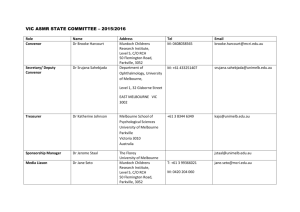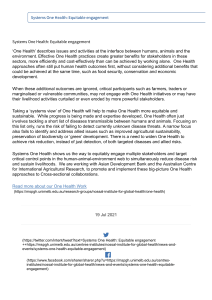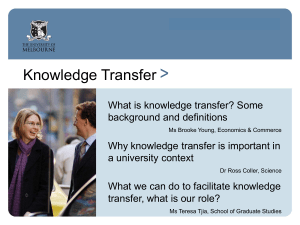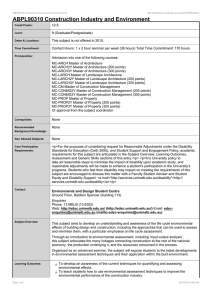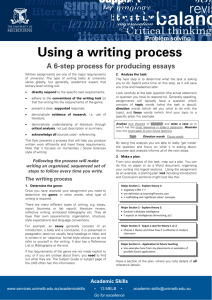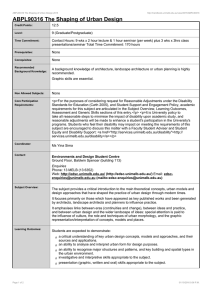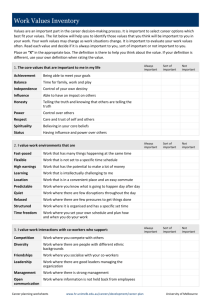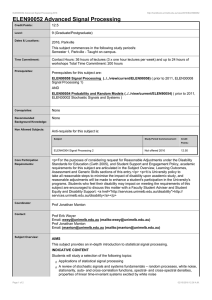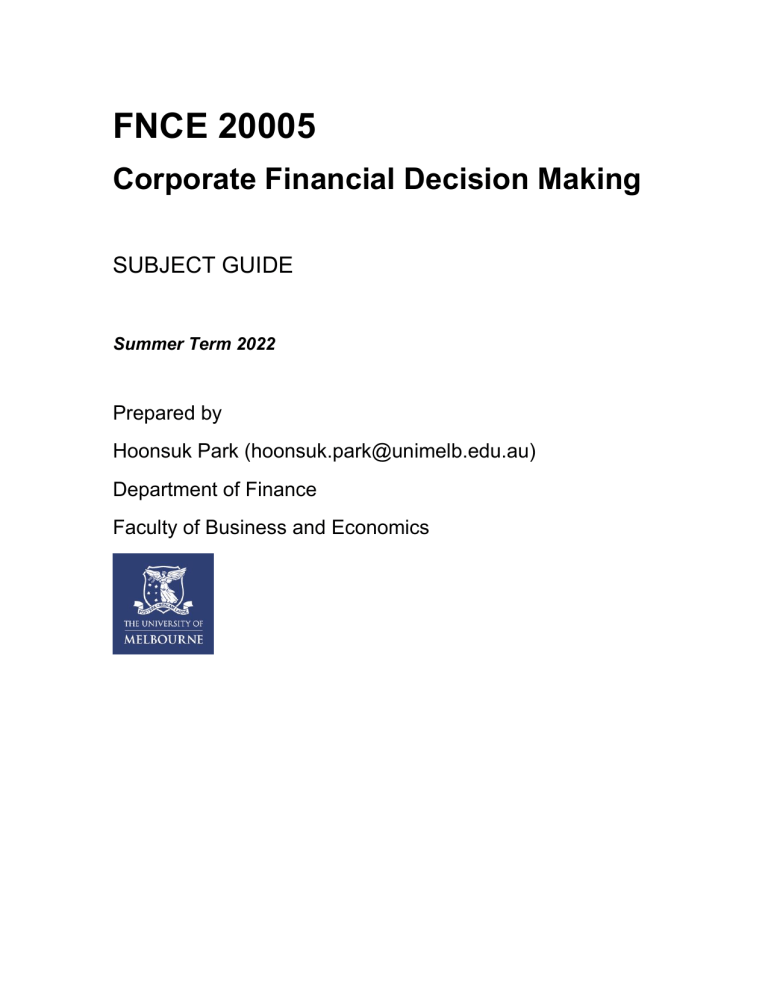
FNCE 20005 Corporate Financial Decision Making SUBJECT GUIDE Summer Term 2022 Prepared by Hoonsuk Park (hoonsuk.park@unimelb.edu.au) Department of Finance Faculty of Business and Economics Subject Outline Introduction Welcome to FNCE 20005 Corporate Financial Decision Making. This subject is an extension of the theory and practice of finance covered in Principles of Finance. Greater details of subject aims, objectives and topics to be covered are provided in the next few pages. Subject Overview and Aims This subject extends the analysis of capital budgeting, capital structure, dividend policy and corporate risk management to the treatment in Principles of Finance. Topics include the effect of the dividend imputation system of taxation on dividend policy, capital structure and capital budgeting; a comprehensive analysis of corporate acquisitions and restructuring; a detailed examination of alternative funding mechanisms including leases; and a discussion of issues of interest in Australian corporate finance. Learning Outcomes Learning Outcomes and Generic Skills To view the subject objectives and the generic skills you will develop through successful completion of this subject, please see the University Handbook: https://handbook.unimelb.edu.au/view/current/FNCE20005 Eligibility and Requirements To view the eligibility and requirements, including prerequisites, corequisites, recommended background knowledge and core participation requirements for this subject, please see the University Handbook: https://handbook.unimelb.edu.au/2022/subjects/fnce20005/eligibility-and-requirements 2 Academic Staff Contact Details Subject Coordinator Contact Details Name: Hoonsuk Park Email: hoonsuk.park@unimelb.edu.au Consultation Hours: To be announced Email Protocol Please note that we are only able to respond to student emails coming from a University email address. Please do not use personal email addresses such as Yahoo, Hotmail or even business email addresses. Emails from non-University email addresses may be filtered by the University’s spam filter, which means that we may not receive your email. All correspondence relating to this subject will only be sent to your University email address. Note that you must first activate your University email address before you can send or receive emails at that address. You can activate your email account at this link: http://accounts.unimelb.edu.au/. While academic staff endeavor to address queries received via email, it is more appropriate to resolve substantive questions during lectures and tutorials and/or during normal consultation hours. With this in mind, we encourage students to attend all lectures and tutorials and to familiarise themselves with the consultation hours offered by the lecturers and tutors in this subject. Lectures Lecture Recordings and Times The lectures will be pre-recorded. The Lecture slides and the lecture recording will be posted by 10:00 am each Wednesday. Lecture Schedule Note that the lecture schedule and content may be varied during the semester. Week Date Commencing Topic Further Reading 1 Jan 3 Introduction and options / Equity / Debt and Leases Chapter 18 / Chapter 9 / Chapters 9, 10.1-10.5 and 15 2 Jan 10 Issues with WACC and capital structure policy / Payout policy Chapters 12, 13 and 14.6 / Chapter 11 3 Jan 17 Mid-semester test 3 4 Jan 24 Advanced topics in capital budgeting: Sensitivity, break-even and decision tree analyses / Corporate Takeovers & Restructuring - Part 1 / Part 2 Chapters 6.6-6.7 / Chapter 19 5 Jan 31 Corporate Takeovers & Restructuring – Part 3 / Part 4 & Real Options / Risk Management Chapter 18, 19 / Reading provided Lecture Slides Lecture slides and the lecture recording will be posted by 10:00 am each Wednesday. Tutorials You are expected to attend a three-hour tutorial every week, either in-person or via Zoom. The tutorial schedule will be posted on Canvas. Please note that there will no tutorials in Week 3. Private Tutoring Services The Faculty has become increasingly concerned about the existence of a number of private tutoring services operating in Melbourne that heavily target University of Melbourne students enrolled in FBE subjects. Students are urged to show caution and exercise their judgement if they are considering using any of these services, and to please take note of the following: Any claim by any of these businesses that they have a “special” or “collaborative” or “partnership” style relationship with the University or Faculty is false and misleading. Any claim by a private tutoring service that they are in possession of, or can supply you with, forthcoming University exam or assignment questions or “insider” or “exclusive” information is also false and misleading. The University has no relationship whatsoever with any of these services and takes these claims very seriously as they threaten to damage the University’s reputation and undermine its independence. It is also not appropriate for students to provide course materials (including University curricula, reading materials, exam and assignment questions and answers) to operators of these businesses for the purposes of allowing them to conduct commercial tutoring activities. Doing so may amount to misconduct and will be taken seriously. Those materials contain intellectual property owned or controlled by the University. We encourage you to bring to the attention of Faculty staff any behaviour or activity that is not aligned with University expectations or policy as outlined above. 4 Assessment Assessment Overview Your assessment for this subject comprises the following: Assessment Task Individual or Group Due Weighting Individual homework assignment Individual Released Monday 31 January – closing 4 February at 5:00 pm Melbourne time 15% Mid-semester test Individual Wednesday 19 January between 4:45 pm to 8:45 pm Melbourne time 25% End-of-semester exam Individual Assessment period 60% Individual homework assignment: An individual homework assignment will contribute 15% to your overall grade. Note that there are no extensions possible for this assignment as it is implemented online with a sufficient lead time to complete it. Further information will be provided via Canvas. Mid-semester test: The mid-semester test will contribute 25% to your overall grade. It will be of 60 minutes of duration and will be comprised of multiple-choice questions and must be submitted within a four-hour window on Wednesday 19 January between 4:45 pm and 8:45 pm Melbourne time. Further information will be provided via Canvas. End-of-semester exam: The final end-of-semester exam will contribute 60% to your overall grade. It will be 120-minute duration. Further information will be provided via Canvas. It is important to note that the University requires that you are available for the entire examination period. Please see the University’s principal dates website for full annual calendar. Special exams will not be provided in cases of absence during the examination period unless the absence is due to serious illness or other extenuating circumstances and a special consideration application has been submitted and approved. Note that a Faculty panel considers all special consideration applications and lecturers have no input in this process. Additional information on special consideration applications appears below. 5 Penalties for Late Submission In order to ensure equality for all students, assignments and examinations (where relevant) must be submitted by specified deadlines. Late submissions will attract the following marking penalties (unless approval for late submission has been granted): Examinations: Late submissions will attract a 10% penalty (of the total maximum mark for the exam) if submitted after the scheduled completion time (for instance, an exam scheduled at 3:00pm with 180 minutes writing time + 15 minutes reading time will have a completion time of 6:15pm). Submissions 30 minutes after the completion time will not be marked. This exam requires file uploads; these files may take some time to complete their upload in peak exam times. Students are advised to allow sufficient time to upload and check files prior to the scheduled completion time. File uploads must be fully completed by the examination completion time. Students who were prevented from submitting due to technical difficulties will need to apply for technical consideration with supporting documentation. Subject Resources Prescribed References Peirson G, Brown R, Easton S, Howard, P and S Pinder, 2015, Business Finance, 12thedition, McGraw-Hill. https://ebookcentral.proquest.com/lib/unimelb/reader.action?docID=5471317 Supplementary Readings Other readings will be provided on the LMS. Academic Integrity Academic Honesty The University maintains high academic standards in its courses and subjects and expects students to conduct themselves in a manner which is fair, honest and consistent with the principles of academic integrity, particularly when undertaking assessment and research. http://academicintegrity.unimelb.edu.au/ Referencing Each source used for a written piece of assessment must be referenced. This is to acknowledge that your material is not based entirely on your own ideas, but is based, in part, on the ideas, information, and evidence of others. This is desirable as you are attending University in order to learn from others. You will be required to use the APA system or Harvard System of referencing. The library has prepared a website to help students correctly reference: 6 http://www.library.unimelb.edu.au/recite It is important that all material you present for assessment is referenced correctly. Material that has not been referenced correctly may be considered to be plagiarised, and as such may be penalised. We will also look for evidence that material included in the bibliography has been used in the assignment. The Academic Skills Unit has produced resources to assist students with referencing https://services.unimelb.edu.au/academicskills/undergrads/top_resources The Library also provides advice on referencing: http://library.unimelb.edu.au/cite University Services Timetable MyTimetable is a class timetabling system that creates individual timetables for students based on submitted class preferences, ensuring everyone has an equitable opportunity of getting their preferred class timetable. You will use this system to create your class timetable prior to each study period. By following a preference-based model, students who have other commitments, such as employment or carer responsibilities, or who are returning or living overseas during the timetabling period, aren’t disadvantaged by their limited availability. When allocating class timetables, MyTimetable also takes into consideration factors such as class size limits and potential clashes to ensure all students are equally accommodated. Further information is available on the web at https://students.unimelb.edu.au/admin/class-timetable Stop 1: Connecting Students and Services Stop 1 is here to provide you with a range of support services throughout your university degree, from help with enrolment, administration and wellbeing to advice on building your skills and experiences. https://students.unimelb.edu.au/stop1 Academic Skills Academic Skills offers a range of workshops and resources to help you with study skills including researching, writing and referencing, presentation skills and preparing for exams. Visit their website via http://services.unimelb.edu.au/academicskills. Service Finder The University of Melbourne offers one of the most comprehensive student support networks in Australia. Use this site to locate a wide range of services http://services.unimelb.edu.au/finder Student Counselling Students attend counselling to talk about personal, emotional, or mental health issues which might be affecting their study and life. The University’s Counselling and Psychological Services (CAPS) provides free, confidential, short-term professional counselling to currently enrolled students and staff. https://services.unimelb.edu.au/counsel/individual 7 Student Equity and Disability Support Student Equity and Disability Support provides services for students who need ongoing support with their studies. They understand that adjustments to learning and assessment are sometimes required to allow all students to reach their full potential. Learn more about the services provided, how to find support and how to register for assistance. http://services.unimelb.edu.au/student-equity University of Melbourne Library Services As well as holding an extensive collection of books, ebooks, digital media and periodicals, library staff provide research guidance and support for students. http://library.unimelb.edu.au/ These Business and Economics Library Guides have been designed specifically for Faculty of Business and Economics staff and students. http://unimelb.libguides.com/sb.php?subject_id=80310 Policy Alternative Exam Arrangements (AEA) The definition of and eligibility requirements for alternative exam arrangements (AEA) can be found via http://students.unimelb.edu.au/admin/alternate . Mid-semester examinations/tests are organised by the Department of Finance. If you wish to request alternative arrangements, email fbe-financeaeas@unimelb.edu.au with a copy of your approved Academic Adjustment Plan. Assessment and Results Policy The University’s assessment policy provides a framework for the design, delivery and implementation of assessment of students in award and non-award courses and subjects. Assessment is designed to contribute to high quality learning by students, and to allow for quality assurance and the maintenance of high academic standards. https://policy.unimelb.edu.au/MPF1326 Exam Policy The University requires that you are available for the entire examination period. Please see the University's Principal Dates via https://www.unimelb.edu.au/dates#2022 for the full annual calendar. Supplementary exams will not be provided in cases of absence during the examination period unless the absence is due to serious illness or other serious circumstances and a Special Consideration application is submitted and approved. Information on Calculators in Examinations Effective from 1 January 2017, the approved calculator for all subjects is the Casio FX82 (any suffix). No equivalent models of calculators will be permitted in exams. 8 You are required to purchase your own calculator and are responsible for ensuring your calculator is in good working order with fresh batteries. Plagiarism and Collusion Plagiarism (failure to cite your sources correctly and completely) and collusion (unauthorised collaboration with another person to prepare an assessment task) are considered academic misconduct and attract severe penalties. More information is available on the University’s Academic Integrity website via http://go.unimelb.edu.au/rha6. Special Consideration As a student, you may experience extraordinary or unusual circumstances, or ongoing circumstances that adversely affect your academic performance. The University has policies in place to support students who are experiencing academic disadvantage. For more information, visit http://students.unimelb.edu.au/admin/special. 9
